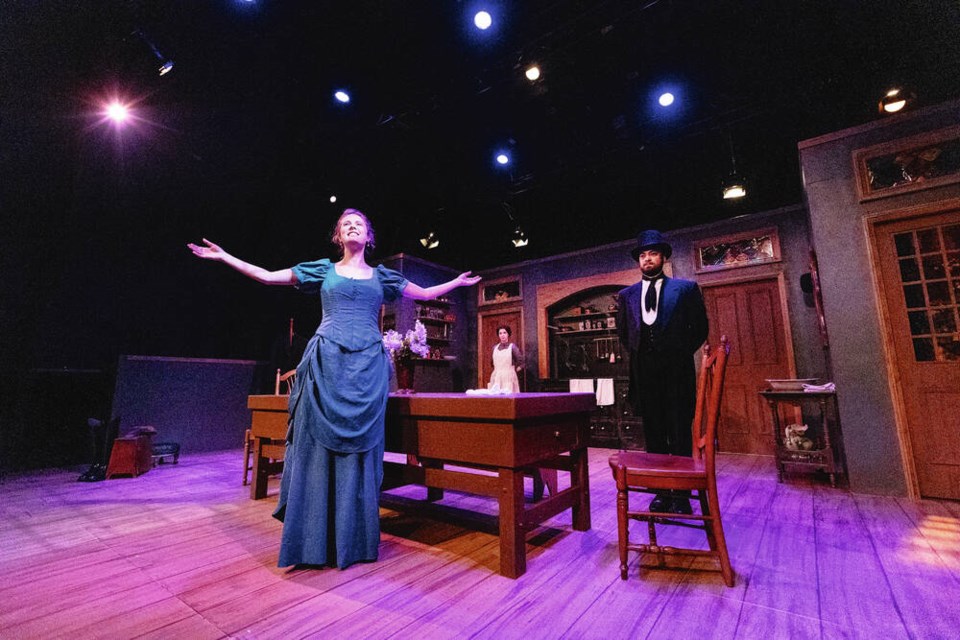Miss Julie
Where: The Roxy Theatre, 2657 Quadra St.
When: June 1-11
Tickets: $15-$47 from bluebridgetheatre.ca
August Strindberg’s Miss Julie, a play about the daughter of a noble who engages in class warfare with her father’s personal valet, has not lost a step in 135 years. It’s as fresh and provocative as the day it was written in 1888.
Power dynamics between the haves and have nots, and the collateral damage that results, is a popular point of focus in theatre, and Miss Julie is considered by many in the performing arts world to be among the blue ribbon winners in that regard. Countless film versions, starring everyone from Helen Mirren to Jessica Chastain, hit Broadway adaptions and groundbreaking operatic iterations have all sprung from the original source material.
Its enduring appeal can be attributed to the gender politics and identity struggles of its main characters. Anachronistic at the time, they have become eerily relevant in today’s world. “The gap between the rich and the poor is getting bigger, much bigger than it was then,” said Mercedes Bátiz-Benét, who is directing Miss Julie for Blue Bridge Repertory Theatre.
“People having servants? That is not going anywhere.”
Bátiz-Benét, who studied poetry, drama, filmmaking, and philosophy at the University of Victoria, and received the Distinguished Alumni Award from UVic’s faculty of fine arts in 2015, is aptly suited to direct Strindberg’s titanic work. Unlike previous directors, who opted to move the setting from Sweden to Russia, France, Argentina, Hong Kong or the like, she decided not to update the era in which it takes place, and kept the drama within the estate of the Swedish count.
“[Strindberg] has done an incredible job of pinpointing that place where class and gender roles are at a heightened state of struggle. By keeping it in the 1880s, I really think audiences will realize how little has changed. Even though people are in period costumes, the piece is very much relevant — especially for women.”
A Swedish count is a character in Miss Julie, though the role is never cast; he’s merely symbolic, there to remind the characters of his patriarchal importance. That all-consuming power is an essential element of the story, according to Bátiz-Benét. His daughter wants more from life, as do his servants. Their unhappiness binds them together, and becomes a revealing plot device up until the play’s final minutes.
“Not much has changed. In fact, we seem to be going backwards in many countries. Women are losing the right over their own bodies and their own choices. It’s a good reminder. This is an ongoing conversation. Even though we had women’s liberation in the ’60s, that doesn’t mean equality is here. We haven’t even gotten there yet.”
The one-act three-hander runs through June 11 at The Roxy Theatre and stars Melissa Taylor in the title role. Kholby Wardell plays the valet and Stephie Bright his wife. The meat of the milieu is the interplay between Miss Julie and Jean the valet, whose verbal battles provide an interesting juxtaposition.
That aspect of the production is what appealed to Bátiz-Benét, who comes from a country where the class system is well-defined. She moved to Canada from Mexico, where she was born and raised, in 1997, and has been the artistic director of Victoria’s Puente Theatre since 2011.
“I come from a country where social class is so marked, and you live with that every second of the day. There is a huge portion of the population [in the service industry] and from the moment they are born, inescapably, until the day they die, their family bloodline is going to be at the service of richer people. Maids have maids in Mexico.”
Producing the play in Victoria, which accurate or not has garnered a reputation as an aristocratic enclave, provides more food for thought, Bátiz-Benét said. “More and more people here, I see, are employing maids and people who cook. That class is growing here. This play shows you how little things have changed. We’re still there.”
>>> To comment on this article, write a letter to the editor: [email protected]



